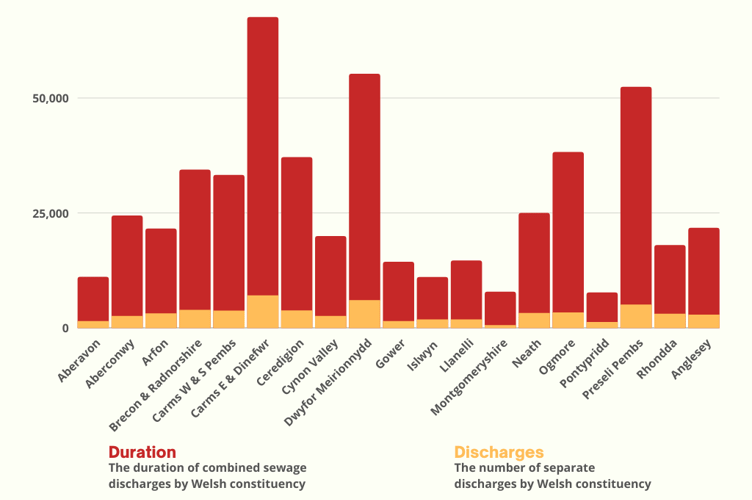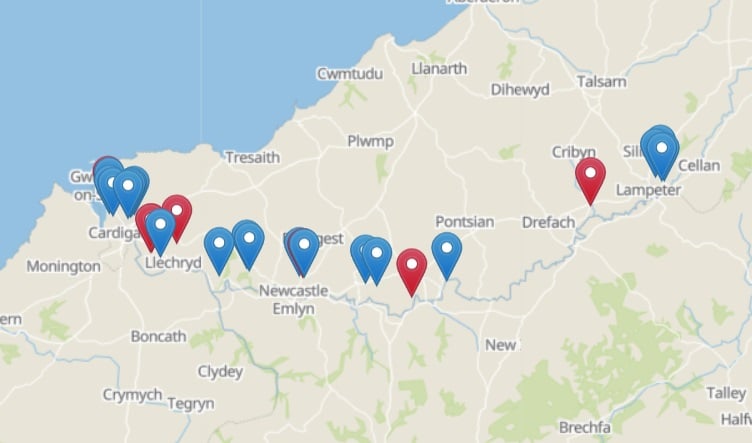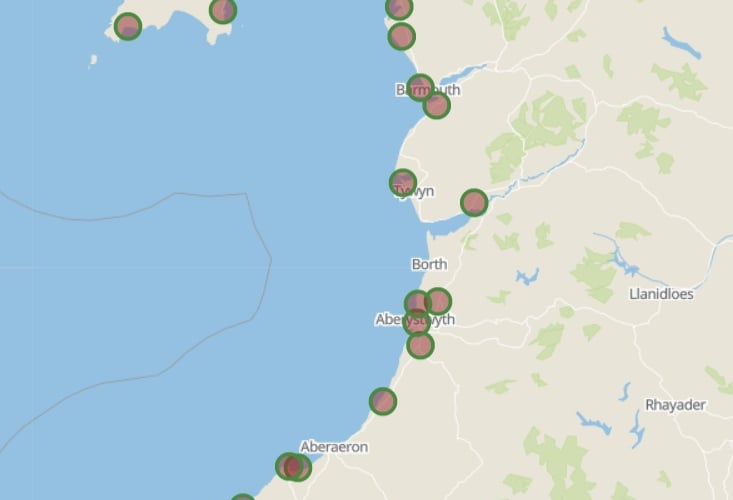Seas, rivers and waterways in Ceredigion and Gwynedd endured some of the highest levels of sewage pollution in England and Wales last year, new figures have revealed.
Data released last week from the country’s primary water supplier Dŵr Cymru and environmental regulator Natural Resources Wales (NRW) revealed a concerning record of discharges across the nation in 2022.
An analysis of the data estimates Dwyfor Meirionnydd, which makes up the majority of Gwynedd county, saw more than 6,000 dumps last year.
This is the second highest of any constituency in England and Wales - though the number has fallen by about 900 on 2021.
Website Top of the Poops - which analysed the latest data - claims last year’s discharges equate to about 50,000 hours (down from nearly 70,000 the year before) of untreated effluent being spewed into the region’s rivers and seas – equivalent to about five-and-a-half years.
In neighbouring Ceredigion, the analysis shows there were just over 3,800 sewage overflows totalling more than 33,000 hours of discharge (a reduction of about a quarter on the year before) – the ninth longest duration in England and Wales last year.
It also shows there were a further 3,100 dumps for about 18,000 hours in total in the constituency of Arfon in the northern most area of Gwynedd county – which puts the constituency the 27th highest (out of 543) for the longest periods of overflow. This is a drop of nearly a third on the year before.

Controversy surrounds the practices of the UK’s private water companies which are legally entitled to release sewage to relieve pressure on the system, mostly during periods of extreme weather.
The private water sector refers to such discharges as combined storm overflows (CSOs) and warns of flooding and damage to the system if they are prevented. But opponents say companies have neglected an antiquated network of pipes which increases the need for the divisive practice.
In what the water industry is hailing as a success, rates of storm overflow across all the nation’s providers are down for the second year running.
Data from the Environment Agency (the English regulator), which was also analysed by the Top of the Poops, revealed there was an average of 824 spills a day in England and Wales last year.
The 301,000 discharges represent a 19 per cent fall from 2021 levels, although opponents argue much of this can be attributed to the unprecedentedly dry weather throughout much of the year.
A Dŵr Cymru spokesperson told the Cambrian News there was a 12 per cent reduction in the average number of storm releases per storm overflow compared 2021, as well as a 25 per cent reduction in total spill duration in 2022, from 807,512 hours to 602,987.5 hours.
The Top of the Poops website also features a breakdown of the estimated frequencies of discharges in particular rivers and coastlines in both Ceredigion and Gwynedd.
This includes the River Teifi which, data suggests, saw the second longest total duration of discharges of any river in the country last year – and the sixth longest of any in England and Wales.

There were about 1,900 separate discharges in the Teifi, Wales’ longest river, equating to a duration of 14,000 hours.
When it comes to beaches, New Quay beach in south Ceredigion saw a dramatic inflation in discharges reaching a duration of 1,800 hours (up nearly 400) from 138 separate incidents during last year, bucking a downward national trend. It saw the fifth most sewage overflow of any beach in Wales.
Aberystwyth South saw 1,500 hours of discharges, down a quarter on the year before, and nearly 200 individual dumps. It saw the ninth longest duration of dumping of any Welsh beach.
In an improvement on last year, Morfa Nefyn beach in Gwynedd saw the 16th highest number of separate incidents (in England and Wales) equating to more than 1,500 hours. But this represented a dramatic drop of around 2,750 hours on 2021.
Tywyn in Gwynedd and Poppit West near Cardigan and St Dogmaels also saw the 13th and 11th longest durations of discharge in Wales respectively.

The Top of the Poops website includes a clear disclaimer that the interpretation of the data provided for Wales was less straightforward than for English companies, so there is greater room for error.
The website producers confirmed to The Cambrian News following questioning that no correction had ever been requested from Dŵr Cymru.
A spokesperson said: “There was a modest reduction in sewage overflows in 2022, compared to the previous year, however 2022 also saw a lower-than-average rainfall - so really this outcome cannot be linked with any affirmative action by any water company - it is just their luck.
“There is no reason, except in genuinely exceptional circumstances for raw sewage to be poured into our waterways.
“Circumstances like these might occur once every few years, not hundreds of thousands of times a year - in the case of Dwr Cymru.
“It is a diversionary tactic to talk about agricultural run-off. Of course, this should be addressed - it is simply corporate whataboutery, as part of the ‘deny, delay, deflect’ communications strategy.
“We have received no complaint about any of the figures on our site from any water company - we would welcome any feedback regarding their accuracy and would happily amend any data found to be inaccurate.
“Dwr Cymru releases sewage 218 times a day, on average, into Welsh (and some English) waterways.
“Should the chief executive be paid £560,000 for this?”
Llandysul environmental campaigner Robert Winter also criticised not-for-profit Dŵr Cymru over handing out performance-related bonuses of nearly seven-figures to its top three executives over the last two years.
Based on figures from their audited accounts, Peter Perry (chief executive), Mike Davis (chief financial officer) and Chris Jones (executive director) took home bonuses worth £931,000.
Mr Perry earned a basic salary of £332,000 last year and £232,000 in short and long term bonuses.
Ceredigion Liberal Democrat Leader Cllr Elizabeth Evans said: “It is tragic that Ceredigion has some of the most sewage-filled rivers in the entire UK. This issue is placing human health in danger alongside our wildlife and tourism industry.
“The Labour-Plaid Cymru partnership in Cardiff Bay has failed at every step to take this issue seriously.
“Now they expect the taxpayers to pay to clean up their mess while water company executives have spent years siphoning off money to pay themselves large bonuses.
“These large bonuses should be banned, and the money reinvested into improving infrastructure. Dŵr Cymru is meant to be a non-profit.”
A Dŵr Cymru spokesperson said: "With monitors now on over 99.5 per cent of our overflows, we are able to provide one of the most comprehensive reports on how our storm overflows perform.
"We report this information to our environmental regulators and also provide real time spill information for key bathing waters to interested bodies, including Surfers Against Sewage and Rivers Trust.
"While we are pleased to see the reduction, which in part is due to the investment work we are undertaking to reduce spills, the reduction has also been influenced by the weather we saw last year.
"The annual rainfall for the year was 10 per cent below the long term average, we saw the driest January-August period since 1976 and drought conditions were declared across parts of Wales and England.
"The total removal of combined storm overflows from our system is unaffordable and would take decades and therefore is not an option but what is in our control is the ability to target investment to CSOs which have the biggest environmental impact.
"That is why we are investing significantly to improve CSOs with £140m being invested between 2020-2025 and a further £420m planned from 2025 to 2030.
"Our investment to date in our wastewater system has delivered real improvements and helped ensure Wales has over a third of the UKs Blue Flag beaches while only having 15 per cent of the coastline and that 40 per cent of our rivers and waterbodies meet good ecological status compared to 16 per cent in England.
"However, we recognise that with environmental legislation tightening and customer expectations changing, more needs to be done to protect bathing and river water quality.
"Equally as important as tackling CSO’s is tackling phosphorous pollution and we are delivering a comprehensive programme of upgrades to our wastewater treatment works that will remove 90 per cent of our phosphorous discharges by 2030."
An NRW spokesperson said: "In the main, the improvement is due to dry weather and drought conditions in 2022, rather than action by water companies.
"We know that sewer overflows exist and are necessary to prevent flooding of people’s homes with raw sewage.
"Our role is to ensure that permits to discharge, issued by NRW, are complied with by water companies.
"We also ensure that the sewer network is improved to reduce or eliminate spills and to make sure that it is operating as designed and to the latest standards.
"We share the wider public concern and are equally concerned about the impact of storm discharges on our water quality and are calling for action now to prevent storm overflows causing environmental harm.
"This means the right mix of maintenance, management and investment by water companies, alongside action to drive down surface water entering sewers and the public using sewers appropriately.
"NRW is providing evidence on the scale of investment required to inform Ofwat’s review of Water company prices, which plays a key role in determining the scale of action that water companies undertake between 2025 and 2030.
"We have a programme in place with water companies in Wales to investigate and rectify any issue of non-compliance. We assess whether there is an environmental impact from the discharges and require the appropriate investment to deliver improvements to the wastewater infrastructure.
"We want all water companies to meet the expectations of their customers and the needs of our environment. We will continue to challenge the water companies to make sure storm overflows are properly controlled. We will investigate and where appropriate take the required enforcement action."
NRW confirmed to the Cambrian News there are 220 unpermitted overflows from water companies to waterways in Wales. A spokesperson said all of these overflows have monitoring equipment which was installed at NRW's request
"To address this in future, we have put a programme in place to ensure that all unpermitted storm overflows that have been identified in Wales are brought within our regulatory framework, they said.
"In this way we will assess whether there is an environmental impact from the discharges and require the appropriate investment to deliver improvements to the wastewater infrastructure."




